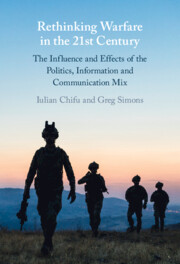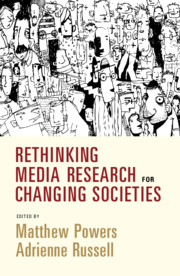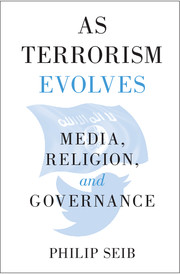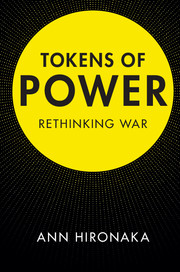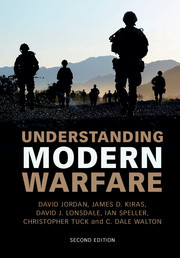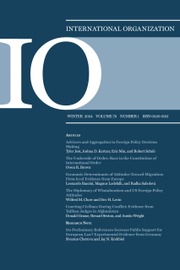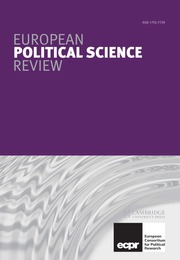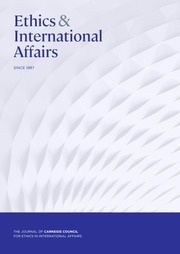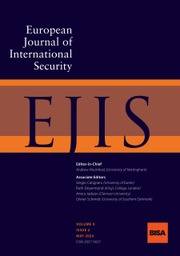Rethinking Warfare in the 21st Century
The Influence and Effects of the Politics, Information and Communication Mix
$110.00 ( ) USD
- Authors:
- Iulian Chifu, National Defence University, Bucharest
- Greg Simons, Uppsala Universitet, Sweden
- Date Published: July 2023
- availability: This ISBN is for an eBook version which is distributed on our behalf by a third party.
- format: Adobe eBook Reader
- isbn: 9781009355223
Find out more about Cambridge eBooks
$
110.00 USD
( )
Adobe eBook Reader
Other available formats:
Hardback
Looking for an examination copy?
If you are interested in the title for your course we can consider offering an examination copy. To register your interest please contact [email protected] providing details of the course you are teaching.
-
This book seeks to critically review and evaluate the changes and consistencies in how warfare is interpreted and represented by academics, mass media outlets and political actors in the 21st century. The authors suggest that it is essential to understand the evolution and transformation of contemporary warfare's conceptualisation and practice in order to make sense of the current global geopolitical transformations that are in process, from a unipolar to multipolar global order. They therefore examine the various key actors in international relations from conceptual, theoretical and empirical perspectives through thematic chapters that demonstrate the increasingly central role played by intangible factors in the representation and management of contemporary armed conflict. The book stresses the need to reflect and rethink the potentially highly problematic trajectory of the global community within the framework of 21st century warfare's political and informational influence and effects.
Read more- A critical and pluralist approach to information and knowledge on the subject of the politics and communication of contemporary warfare
- Includes interdisciplinary and multidisciplinary perspectives, showing how different disciplines can interact to produce more comprehensive interpretive results of the empiric
- Provides numerous real-world examples to demonstrate the theories introduced, including: technology and media, the Covid pandemic, conflicts in Syria and the invasion of Ukraine
Reviews & endorsements
‘Waging of war in the 21st century has become a highly politicised warfare, which means it is the main instrument for achieving political objectives. If it is fabricated, manipulated and justified for hearts and minds, that is facilitated by the new technological advances of our era and launched against global publics before the war takes place in regions away from the western hemisphere. This book illustrates the resulting cognitive dissonance induced by the mixture of politics and communication, such as the façade of humanitarian intervention and pre-emptive warfare in the post-cold war era that resulted in intertwined wars throughout the world, so we are really facing a different generation of warfare. As a result, this timely publication is very welcome and appreciated. Rethinking Warfare in the 21st Century unlocks the complexity of contemporary warfare through engaging with it on the levels of both theory and practice in the midst of an ongoing geopolitical power transition in international relations and global politics.’ Davoud Gharayagh-Zandi, Department of Political Science, Faculty of Economics and Political Science, Shahid Beheshti University, Tehran-Iran
See more reviews‘The late modern age has strengthened the role of information and communication in all areas of human interaction. The authors focus on the change, offering a comprehensive and convincing analysis of how the change affects the character, geographic scope and intensity of contemporary warfare.’ Andrei Tsygankov, Department of International Relations, San Francisco State University
‘Iulian Chifu and Greg Simons have put together a critical review of the current state of politics, information and knowledge within the context of contemporary warfare. This is done simultaneously from complementary theoretical and empirical points of view, posing searching research questions in the introduction and answering them in the conclusion, bringing together a vast amount of information that then transforms into clear and coherent lessons. The conclusions are as revealing and illustrative as they are concerning.’ Valentin Yakushik, Professor of Political Science, Chairman of the Supervisory Board of the Ukrainian Institute of Politics and Executive-in-Residence Fellow, Geneva Centre for Security Policy
Customer reviews
Not yet reviewed
Be the first to review
Review was not posted due to profanity
×Product details
- Date Published: July 2023
- format: Adobe eBook Reader
- isbn: 9781009355223
- availability: This ISBN is for an eBook version which is distributed on our behalf by a third party.
Table of Contents
1. Introduction: motivation, purpose and structure of the book
2. Informational warfare: a theoretical approach
3. Understanding political and intangible elements in modern wars
4. The fourth generation of informational warfare
5. The culture and language of contemporary armed conflict
6. Different shades of information and communication in armed conflict: white, grey and black
7. The effects of technological evolution and social media on the individual, society and politics
8. Western hybrid warfare: crisis and subversion in regime change
9. Geopolitics in the age of social media: the struggle for influence on Ukraine
10. The Ukrainian and Syrian conflicts: civil wars or geopolitical Shatterbelts?
11. The impact of the COVID-19 pandemic on man, society, politics and international relations: the role of social media and informational warfare
12. Conclusions: summing up the knowledge and answering the questions.
Sorry, this resource is locked
Please register or sign in to request access. If you are having problems accessing these resources please email [email protected]
Register Sign in» Proceed
You are now leaving the Cambridge University Press website. Your eBook purchase and download will be completed by our partner www.ebooks.com. Please see the permission section of the www.ebooks.com catalogue page for details of the print & copy limits on our eBooks.
Continue ×Are you sure you want to delete your account?
This cannot be undone.
Thank you for your feedback which will help us improve our service.
If you requested a response, we will make sure to get back to you shortly.
×
